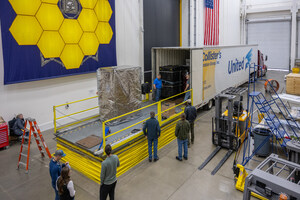BOULDER, Colo., Aug. 20, 2020 /PRNewswire/ -- Ball Aerospace has successfully completed on-orbit testing of NASA's Green Propellant Infusion Mission (GPIM), which included ASCENT, a non-toxic, high-performance propellant developed by the Air Force Research Laboratory (AFRL), on board a Ball-built small satellite.
GPIM launched on June 25, 2019 at 2:30 a.m. EDT on board a SpaceX Falcon Heavy rocket and was commissioned in early July of the same year.
"The successful completion of this mission advances in-space propulsion for the entire user community, which opens up the possibility for a variety of missions," said Dr. Makenzie Lystrup, vice president and general manager, Civil Space, Ball Aerospace. "GPIM has the potential to inspire new ideas and new missions, which could mean smaller spacecraft, faster and easier ground processing, longer design lives and more – enabling science at any scale."
Ball designed and built the small satellite, which contains NASA's first opportunity to demonstrate the practical capabilities of a "green" propellant and propulsion system in orbit – an alternative to conventional chemical propulsion systems. The propellant is a Hydroxyl Ammonium Nitrate fuel and oxidizer monopropellant developed by the AFRL.
GPIM is part of NASA's Technology Demonstration Missions program within the Space Technology Mission Directorate (STMD), and Christopher McLean of Ball Aerospace serves as the principal investigator. Aerojet Rocketdyne designed and built the thruster payload for GPIM that provides propulsion for the spacecraft.
"Aerojet Rocketdyne's specially-engineered green propulsion system proved that satellites can operate on orbit utilizing hydrazine-alternative propellant," said Jim Maser, senior vice president of space at Aerojet Rocketdyne. "With an extensive offering of flight proven chemical and electric propulsion systems, green propulsion was a natural progression for the company and we're excited to help usher in a new era of satellite operations."
Ball Aerospace and its partners tested the satellite thruster capabilities by verifying the propulsion subsystem, propellant performance, thruster performance and spacecraft attitude control performance. While in orbit, GPIM is testing the fuel and compatible propulsion system – which includes tanks, valves, and thrusters – by conducting orbital maneuvers to demonstrate the propellant's performance during attitude control maneuvers and orbit lowering.
With approximately 95 percent of the demonstration completed to date, the flight mission has proven that the ASCENT fuel and compatible propulsion system can be a viable, effective alternative for NASA and the commercial spaceflight industry. GPIM will soon begin a final series of burns that will deplete the remainder of the ASCENT fuel and the spacecraft will reenter the earth's atmosphere to complete the mission.
As the prime contractor for GPIM, Ball Aerospace is responsible for system engineering; flight thruster performance verification; ground and flight data review; spacecraft bus development; payload assembly integration and test; and launch and flight support. GPIM uses the Ball Configurable Platform (BCP) small satellite, which is about the size of a mini refrigerator. The BCP small satellite provides standard payload interfaces and streamlined procedures, allowing rapid and affordable access to space with flight-proven performance. There are currently two additional BCP small satellites performing on orbit: STPSat-2, which launched in November 2010, and STPSat-3, which launched in November 2013. The two STP satellites were built for the U.S. Air Force Space Test Program's Standard Interface Vehicle (STP-SIV) project.
Powered by endlessly curious people with an unwavering mission focus, Ball Aerospace pioneers discoveries that enable our customers to perform beyond expectation and protect what matters most. We create innovative space solutions, enable more accurate weather forecasts, drive insightful observations of our planet, deliver actionable data and intelligence, and ensure those who defend our freedom go forward bravely and return home safely. Go Beyond with Ball.® For more information, visit www.ball.com/aerospace or connect with us on Facebook or Twitter.
About Ball Corporation
Ball Corporation (NYSE: BLL) supplies innovative, sustainable aluminum packaging solutions for beverage, personal care and household products customers, as well as aerospace and other technologies and services primarily for the U.S. government. Ball Corporation and its subsidiaries employ more than 18,300 people worldwide and reported 2019 net sales of $11.5 billion. For more information, visit www.ball.com, or connect with us on Facebook or Twitter.
Forward-Looking Statements
This release contains "forward-looking" statements concerning future events and financial performance. Words such as "expects," "anticipates," "estimates," "believes," "targets," "likely," "positions" and similar expressions typically identify forward-looking statements, which are generally any statements other than statements of historical fact. Such statements are based on current expectations or views of the future and are subject to risks and uncertainties, which could cause actual results or events to differ materially from those expressed or implied. You should therefore not place undue reliance upon any forward-looking statements and any such statements should be read in conjunction with, and, qualified in their entirety by, the cautionary statements referenced below. The company undertakes no obligation to publicly update or revise any forward-looking statements, whether as a result of new information, future events or otherwise. Key factors, risks and uncertainties that could cause actual outcomes and results to be different are summarized in filings with the Securities and Exchange Commission, including Exhibit 99 in our Form 10-K, which are available on our website and at www.sec.gov. Additional factors that might affect: a) our packaging segments include product capacity, supply, and demand constraints and fluctuations; availability/cost of raw materials and logistics; competitive packaging, pricing and substitution; changes in climate and weather; footprint adjustments and other manufacturing changes, including the start up of new facilities and lines; failure to achieve synergies, productivity improvements or cost reductions; mandatory deposit or other restrictive packaging laws; customer and supplier consolidation; power and supply chain interruptions, including due to virus and disease outbreaks; potential delays and tariffs related to the U.K's departure from the EU; changes in major customer or supplier contracts or a loss of a major customer or supplier; political instability and sanctions; currency controls; changes in foreign exchange or tax rates; and tariffs, trade actions, or other governmental actions, including business restrictions and shelter-in-place orders in any country affecting goods produced by us or in our supply chain, including imported raw materials, such as those related to COVID-19 and those pursuant to Section 232 of the U.S. Trade Expansion Act of 1962 or Section 301 of Trade Act of 1974; b) our aerospace segment include funding, authorization, availability and returns of government and commercial contracts; and delays, extensions and technical uncertainties affecting segment contracts; c) the company as a whole include those listed plus: the extent to which sustainability-related opportunities arise and can be capitalized upon; changes in senior management, succession, and the ability to attract and retain skilled labor; regulatory action or issues including tax, environmental, health and workplace safety, including U.S. FDA and other actions or public concerns affecting products filled in our containers, or chemicals or substances used in raw materials or in the manufacturing process; technological developments and innovations; the ability to manage cyber threats and the success of information technology initiatives; litigation; strikes; disease; pandemic; labor cost changes; rates of return on assets of the company's defined benefit retirement plans; pension changes; uncertainties surrounding geopolitical events and governmental policies both in the U.S. and in other countries, including policies, orders and actions related to COVID-19, the U.S. government elections, budget, sequestration and debt limit; reduced cash flow; interest rates affecting our debt; and successful or unsuccessful joint ventures, acquisitions and divestitures, and their effects on our operating results and business generally.
SOURCE Ball Aerospace

Related Links
WANT YOUR COMPANY'S NEWS FEATURED ON PRNEWSWIRE.COM?
Newsrooms &
Influencers
Digital Media
Outlets
Journalists
Opted In






Share this article